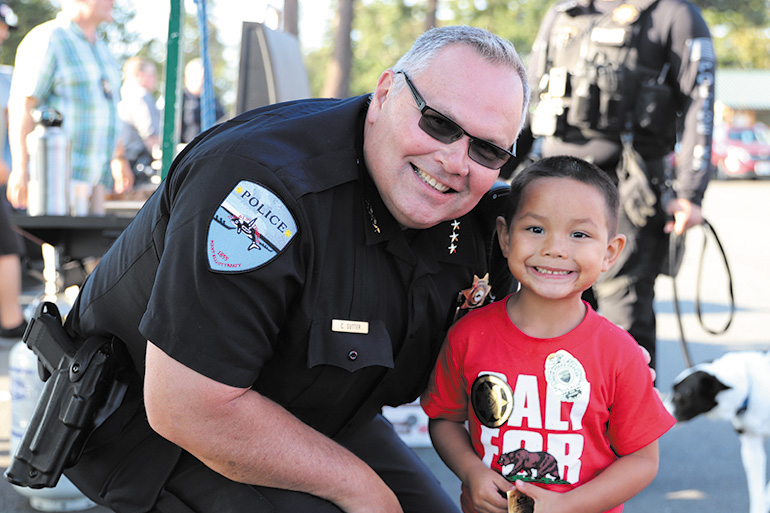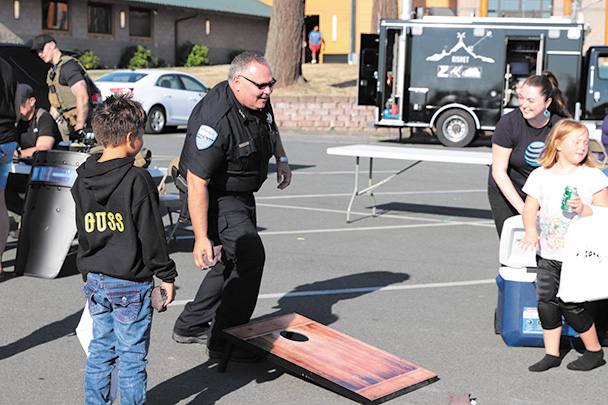
By Kalvin Valdillez, Tulalip News
May 25, 2020 the world was shocked, outraged and heartbroken. The murder of George Floyd was captured on camera and circulated the internet for all to see. A black man unjustly and untimely taken from his loved ones at the hands of four law officials, exposing many to a reality that is unfortunately all too familiar within black communities across the country.
The call for justice was immediate. In the middle of a pandemic the Nation’s obvious divide split even deeper and a lot of people’s ethics and morals were voluntarily put on display, for better or for worse. Whether it was marching at Black Lives Matter rallies or spewing emotions over keyboards, the world began to see exactly where people, companies and businesses stood on heavy topics such as police brutality and systemic racism.
Since accepting the position of Chief of Police for the Tulalip Police Department (TPD) back in 2018, Chris Sutter has designed a community-driven police force, prioritizing the safety of the tribal community at large. At a time when local police departments are under the watchful lens of their towns and cities, Chief Sutter’s main objective of creating a strong bond between officer and citizen has never faltered and his motives never changed.
“I feel it’s very important, especially in our tribal community, to build relationships and get to know the community members,” expressed Chief Sutter. “A big part of that is building trust and working with the community to help solve problems. I try to model that behavior by taking up opportunities to go to local Tulalip community events. I also work closely with the Tulalip Citizen-Police Advisory Board, which is comprised of Tulalip citizens who are elected to provide important oversight and recommendations to the Chief of Police.
“One of the areas that we build trust is through accountability. I’ve implemented a system that says all complaints will be received, reviewed and investigated. And every complaint is logged and tracked. Shortly after I arrived here, we implemented a citizen feedback form on our website. Citizens can complete the form, they can call on the phone or come in person, we’ll accept all feedback. These are internal systems that we’ve put in place to hold ourselves accountable to the community, and to also help the officers in our department improve and establish trust and credibility.”

Following the George Floyd killing, millions nationwide took to the streets calling for the arrest and prosecution of the officer who committed the murder by strangulation, as well as the officers who stood by and watched as a man who pleaded ‘I can’t breathe’, had his last breath stolen. Although most events were organized to be peaceful marches, many were taken over by radicals with intentions of raising tension. And some, under the guise of ‘protecting their towns’, openly toted assault weapons and waved the confederate flag.
During the early days of protests, riots ensued in many cities and businesses were targeted and looted, by whom was hard to say although both political parties seemingly agreed to blame the damages on extremist groups whose views more aligned with the opposite party, depending on who you asked.
After a chaotic week in Seattle, the alleged radical groups began organizing lootings via Twitter and high on the list was the Seattle Premium Outlets which is located in the city of Quil Ceda Village on the Tulalip Reservation.
Alongside the Sacred Riders and Tulalip land protectors, Chief Sutter and crew defended the sduhubš home base by quickly shutting down the entire city, which included large corporations that were still in operation during COVID-19 like Walmart, Cabela’s, and Home Depot, as well as a handful of small businesses. All roads and overpasses leading into the city were also swiftly closed and TPD officers were stationed at blockades throughout the reservation to prevent any destruction or theft from the outlet mall. For nearly five entire days, the TPD stood side-by-side with their community, protecting the land and its people with minimal arrests and damages occurring.
Days following the looting threats, TPD participated in a rally against racism organized by the Marysville YMCA. Chief Sutter and multiple police officers marched along with Tulalip tribal members and the local populace through the Marysville streets, from Jennings Park to the Ebey Slough Waterfront.
“The Marysville YMCA [director] asked us to participate with the Tulalip Tribes in a peaceful rally and march in support of anti-racism, and in support of Black Lives Matter. I was honored to speak at the beginning of the rally and march with the Black Student Union, community members and Tulalip tribal members. I want the community to know I stand united against racism. I stand united against police misconduct and abuse.
“When the George Floyd murder occurred in police custody – death at the hands of four Minneapolis police officers, I was, as the rest of the world, shocked, saddened and disgusted by watching a human being’s life taken on video at the hands of police. I find that reprehensible and inexcusable and totally unacceptable in any context. There’s no excuse for that type of behavior. I fully support both the firing and the criminal prosecution of those officers. My goal is to never have that happen here at Tulalip.”
Many people who come from a community where police misconduct is practiced regularly, often reference a glaring disconnect between their police department and the people they are hired to protect and serve. Whereas at Tulalip, Tribal PD attend a myriad of events throughout the year, whether it be sporting, cultural, or scholastic, the officers take the time to build personal relationships with the people of Tulalip.
In addition to taking a stance against racism, supporting the Black Lives Matter movement, and protecting Tulalip territory, TPD has helped out immensely since Tribal government shutdown during the outbreak of COVID-19. Over the past few months, the department has assisted at a number of Tribal member grocery and food distributions, as well as lending a hand to the Tulalip Senior Center to assemble and deliver care packages to local elders, which included masks and gloves.
Another aspect to Chief Sutter’s stronger together plan was the development of the Professional Standards Unit in which he intentionally placed a qualified Tribal member, Angela Davis, whose duties are to thoroughly vet potential recruits, investigate and manage both citizen and internal complaints, as well as help update and revise TPD’s policies and procedures.
“I think it’s really good that we have a Chief who is willing to stand alongside the people and allow them the space to express their freedom and be heard in a peaceful way,” Angela reflected. “Especially for us as Indigenous people, and everything that happened to us, it just makes sense that we would support another minority group that things are happening to that shouldn’t. I think it helped bring the African American and Native American communities closer together. I think the Chief is going in the right direction, there’s some changes taking place to be more organized and more accountable. We’re getting bigger and a culture change is much needed.”
Angela and the Chief both explained that in the wake of the George Floyd murder, they are currently revising the TPD’s use of force policy, specifically prohibiting neck choke holds like the tactic used to execute George Floyd. Additionally, Chief Sutter is amping up trainings on de-escalation, stating he doesn’t want his officers to get involved physically unless its reasonably objective as well as necessary for the safety of the individual, the officers and the public.
“I brought in an expert, a master instructor in the use-of-force, to consult with me on that policy revision,” said Chief Sutter. “I am also looking nationwide at the best practices on de-escalation and use-of-force. I want every reasonable opportunity to de-escalate a critical situation to minimize the amount of force an officer has to use to bring that situation under control.
“We will integrate communication and de-escalation tactics into every call we go to. I want our officers to be communicators, problem solvers and peacekeepers,” he continued. “I subscribe to the guardian philosophy, the guardian versus warrior mentality. Our officers are not at war with our community. We are here to protect our community and to safeguard them, it’s a mental mind shift. And when force is necessary, ensuring that we’re using only the appropriate level of force. Something that I’ve implemented is a critical incident review process form. Every time force is used in this police department, it will be reviewed through the chain of command.”
To round out the mission of unity between the Tribe and the police, Chief Sutter’s latest task is getting more Tulalip representation on the squad. He will be making a focused effort to bring more Tribal members onto the force during the next round of recruitment.
With a few adjustments and revisions, the police department is heading in the right direction, working to ensure the tribal society that they can depend on local law officials through both the good and difficult times as we venture into a future of uncertainty and unknown. Even when a good chunk of American municipalities are currently at odds with their local police, and many of those departments will likely be defunded (funds redirected to other qualified professionals), TPD and Tulalip stand in unity.
To show the police department that the Tribe returns the love and support, approximately twenty tribal members recently surprised Chief Sutter and squad with a ceremonial blessing, providing the medicine of song and sage.
“My highest goal is that everyone in this community is treated respectfully,” the Chief said. “I was personally touched to see Tulalip members come one evening and offer their prayers and blessings, singing on behalf of our police department. In addition, one tribal member made personalized hand sanitizers for every member of the department, we enjoy very strong support from our Tribal members. I believe there’s a lot of work to do though, and we have plenty of opportunities for improvement in how we build relationships and how we provide exceptional service. I just want our community know how grateful I am to have this honor to serve the Tulalip people.”